|
Books Should Be Free Loyal Books Free Public Domain Audiobooks & eBook Downloads |
|
|
Books Should Be Free Loyal Books Free Public Domain Audiobooks & eBook Downloads |
|
Non-fiction |
|---|
|
Book type:
Sort by:
View by:
|
By: Thomas Bastard (1818-1883) | |
|---|---|
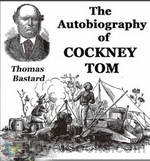 The Autobiography of Cockney Tom
The Autobiography of Cockney Tom
The Autobiography of Cockney Tom, Showing his Struggles through Life, and proving this Truth of the Old Saying "that Honesty is the best Policy". Set in England, South Australia and the goldfields of Victoria Australia in the 1800's. | |
By: Thomas Beames (1815-1864) | |
|---|---|
 Rookeries of London
Rookeries of London
Rev. Thomas Beames was a preacher at St. James, Westminster in London. He compiled his own eye-witness accounts of the most notorious of the slum areas, the Rookeries. In this essay, he passionately discusses the effects of poverty and the mistreatment of the poor and working classes. Much of what he says is still valid today; for example, in discussing over-population and emigration, he mentions the mis-use of land in Britain: "... large tracts of land, such as in Derbyshire, seem only valuable as grouse preserves... | |
By: Thomas Browne | |
|---|---|
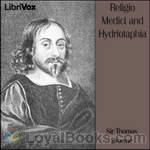 Religio Medici and Hydriotaphia
Religio Medici and Hydriotaphia
Religio Medici (The Religion of a Doctor) sets out Sir Thomas Browne's spiritual testament as well as being an early psychological self-portrait. In its day, the book was a European best-seller. It was published in 1643 by the newly-qualified physician, and its unorthodox views placed it swiftly upon the Papal Index Librorum Prohibitorum in 1645. Although predominantly concerned with Christian faith, the Religio also meanders into digressions upon alchemy, hermetic philosophy, astrology, and physiognomy... | |
By: Thomas Carlyle | |
|---|---|
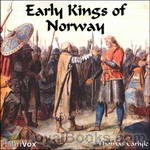 Early Kings of Norway
Early Kings of Norway
“The Icelanders, in their long winter, had a great habit of writing; and were, and still are, excellent in penmanship. It is to this fact, that any little history there is of the Norse Kings and their old tragedies, crimes and heroisms, is almost all due. The Icelanders, it seems, not only made beautiful letters on their paper or parchment, but were laudably observant and desirous of accuracy; and have left us such a collection of narratives (Sagas, literally “Says”) as, for quantity and quality, is unexampled among rude nations... | |
By: Thomas Cooper (1805-1892) | |
|---|---|
 The Bridge of History Over the Gulf of Time: A Popular View of the Historical Evidence for the Truth of Christianity
The Bridge of History Over the Gulf of Time: A Popular View of the Historical Evidence for the Truth of Christianity
Written by the former skeptic, poet, and scholar, Thomas Cooper, The Bridge of History Over the Gulf of Time admirably sets forth a winsome defense of Christianity. Written as the substance of fourteen years of lectures, at the request of his hearers, Cooper leads his reader across the bridge of history, through the centuries, tracing Christianity. At last, he addresses "Leben Jesu" by Dr. David Friedrich Strauss, discusses the historicity of the four Gospels, and offers some concluding evidences for the truth of Christianity. (Introduction by tzieger) | |
By: Thomas Davidson | |
|---|---|
 Rousseau and Education According to Nature
Rousseau and Education According to Nature
In my Volume on Aristotle in this series, I tried to give an account of ancient, classical, and social Education; in the present volume I have endeavored to set forth the nature of modern, romantic, and unsocial Education. This education originates with Rousseau. With much reluctance I have been obliged to dwell, at considerable length, on the facts of his life, in order to show that his glittering structure rests, not upon any broad and firm foundation of well-generalized and well-sifted experience, but upon the private tastes and preferences of an exceptionally capricious and self-centered nature... | |
By: Thomas de Quincey (1785-1859) | |
|---|---|
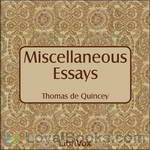 Miscellaneous Essays
Miscellaneous Essays
The Hunter Thompson of the 19th Century, de Quincey is best known for his Confessions of an English Opium Eater (an activity shared with his hero, Samuel Coleridge, much to Wordsworth’s dismay). However, de Quincey’s literary genius is best captured in his essays, and, according to Wikipedia: His immediate influence extended to Edgar Allan Poe, Fitz Hugh Ludlow and Charles Baudelaire, but even major 20th century writers such as Jorge Luis Borges admired and claimed to be partly influenced by his work. | |
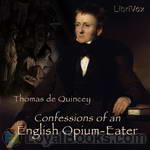 Confessions of an English Opium-Eater
Confessions of an English Opium-Eater
“Thou hast the keys of Paradise, O just, subtle, and mighty Opium!” Though apparently presenting the reader with a collage of poignant memories, temporal digressions and random anecdotes, the Confessions is a work of immense sophistication and certainly one of the most impressive and influential of all autobiographies. The work is of great appeal to the contemporary reader, displaying a nervous (postmodern?) self-awareness, a spiralling obsession with the enigmas of its own composition and significance... | |
By: Thomas Dowler Murphy (1866-1928) | |
|---|---|
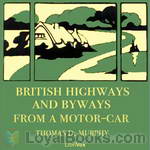 British Highways And Byways From A Motor Car
British Highways And Byways From A Motor Car
In this chronicle of a summer's motoring in Britain I have not attempted a guide-book in any sense, yet the maps, together with the comments on highways, towns, and country, should be of some value even in that capacity. I hope, however, that the book, with its many illustrations and its record of visits to out-of-the way places, may be acceptable to those who may desire to tour Britain by rail or cycle as well as by motor car. Nor may it be entirely uninteresting to those who may not expect to visit the country in person but desire to learn more of it and its people. (Introduction by Thomas Dowler Murphy) | |
By: Thomas D’Arcy McGee | |
|---|---|
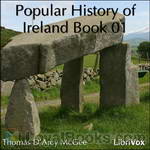 Popular History of Ireland
Popular History of Ireland
Book 1: Thomas D’Arcy McGee was an Irish refugee and a father of the Canadian confederation. His work on Irish history is comprehensive, encompassing twelve books; Book 1 begins with the earliest modern settlement of Ireland and ends with the 8th century. | |
By: Thomas Forsyth Hunt (1862-1927) | |
|---|---|
 The Young Farmer: Some Things He Should Know
The Young Farmer: Some Things He Should Know
| |
By: Thomas Frost (1821-1908) | |
|---|---|
 In Kent with Charles Dickens
In Kent with Charles Dickens
By his own admission, Thomas Frost found it hard to make a living from his writing, and no doubt he used the name of Dickens in the title of this book to boost sales. Frost tells a good tale, and the book is not only of interest to enthusiasts of Dickens and the county of Kent.He includes some of Dickens’ own descriptions of locations, as well as regaling us with anecdotes about towns and villages which he visits, including an account of the last armed rising on British soil – the Battle of Bossenden Wood... | |
By: Thomas Gilbert Pearson (1873-1943) | |
|---|---|
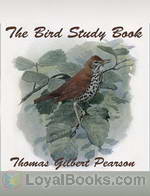 The Bird Study Book
The Bird Study Book
Do you enjoy birdwatching? Would you like to learn a little more about the early conservations efforts to protect wild birds? In the Preface to The Bird Study Book, Pearson tells us “This book was written for the consideration of that ever-increasing class of Americans who are interested in acquiring a greater familiarity with the habits and activities of wild birds. Attention is also given to the relation of birds to mankind and the effect of civilisation on the bird-life of the country. ” An avid ornithologist, T... | |
By: Thomas H. Burgoyne (1855-1894) | |
|---|---|
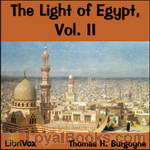 The Light of Egypt, vol II
The Light of Egypt, vol II
"The Light of Egypt" will be found to be an Occult library in itself, a textbook of esoteric knowledge, setting forth the "wisdom Religion" of life, as taught by the Adepts of Hermetic Philosophy. It will richly repay all who are seeking the higher life to carefully study this book, as it contains in a nutshell the wisdom of the ages regarding man and his destiny, here and hereafter. The London and American first edition, also the French edition, Vol. I, met with lively criticism from Blavatsky Theosophists, because it annihilates that agreeable delusion of "Karma" and "Reincarnation" from the minds of all lovers of truth for truth's sake. | |
By: Thomas Henry Huxley (1825-1895) | |
|---|---|
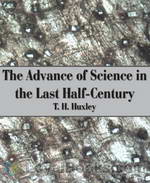 The Advance of Science in the Last Half-Century
The Advance of Science in the Last Half-Century
Thomas H. Huxley, an English biologist and essayist, was an advocate of the theory of evolution and a self-proclaimed agnostic. A talented writer, his essays helped to popularize science in the 19th century, and he is credited with the quote, “Try to learn something about everything and everything about something.” In The Advance of Science in the Last Half Century, he presents a summary of the major developments in Physics, Chemistry and Biology during the period 1839-1889 and their impact on society, within the historical context of philosophical thought and scientific inquiry going back to Aristotle... | |
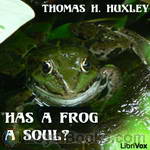 Has a Frog a Soul?
Has a Frog a Soul?
Thomas Huxley, known as “Darwin’s Bulldog” for his championing and development of Darwinism, was perhaps the most important Victorian biologist after Darwin himself. This speech to the Metaphysical Society in 1870 is one of Huxley’s best known texts outside the sphere of his specialism, and remains read today by students of philosophy. In it, Huxley argues from the results of vivisection to metaphysics. | |
By: Thomas Heyden (1798-1870) | |
|---|---|
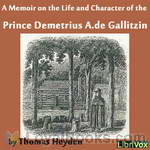 A Memoir on the Life and Character of the Rev. Prince Demetrius A. de Gallitzin
A Memoir on the Life and Character of the Rev. Prince Demetrius A. de Gallitzin
Prince Demetrius of Gallitzin (1770-1840), or "Father Smith," as he was known on the eighteenth century American frontier, was one of the glories of early Catholicism in America. Though a prince by birth, Demetrius discreetly concealed the glory of his earlier life that he might better lead his adopted spiritual children to the glory of eternal life. For more than four decades, he humbly provided for the spiritual needs of courageous pioneers scattered throughout the Allegheny Mountains of central Pennsylvania... | |
By: Thomas Hobbes (1588-1679) | |
|---|---|
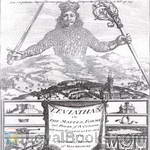 Leviathan, or The Matter, Forme and Power of a Common Wealth Ecclesiasticall and Civil
Leviathan, or The Matter, Forme and Power of a Common Wealth Ecclesiasticall and Civil
Books 1 and 2. Leviathan, or The Matter, Forme and Power of a Common Wealth Ecclesiasticall and Civil is a book written in 1651 by Thomas Hobbes. The book concerns the structure of society (as represented figuratively by the frontispiece, showing the state giant made up of individuals). In the book, Hobbes argues for a social contract and rule by a sovereign. Influenced by the English Civil War, Hobbes wrote that chaos or civil war – situations identified with a state of nature and the famous motto bellum omnium contra omnes (”the war of all against all”) – could only be averted by strong central government... | |
By: Thomas J. Murrey | |
|---|---|
 Fifty Soups
Fifty Soups
| |
 Fifty Salads
Fifty Salads
| |
 Breakfast Dainties
Breakfast Dainties
| |
By: Thomas Kelly Cheyne (1841-1915) | |
|---|---|
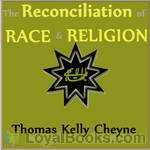 The Reconciliation of Races and Religions
The Reconciliation of Races and Religions
“The primary aim of this work is twofold,” writes Thomas K. Cheyne. “It would fain contribute to the cause of universal peace, and promote the better understanding of the various religions which really are but one religion. The union of religions must necessarily precede the union of races, which at present is so lamentably incomplete…. I have endeavoured to study the various races and religions on their best side, and not to fetter myself to any individual teacher or party, for ‘out of His fullness have all we received... | |
By: Thomas Newbigging (1833-1914) | |
|---|---|
 Lancashire Characters and Places
Lancashire Characters and Places
An eclectic collection of essays on late 19th-century Lancashire culture and life, including essays on the poets John Critchley Prince and Edwin Waugh. Thomas Newbigging was born in Glasgow and died in Knutsford, Chesshire, living in between in Rossendale, Pernambuco, and Manchester. A gas manager by profession and writer-historian by inclination, his two major works were the Handbook for Gas Engineers and Managers (1889) and the History of the Forest of Rossendale (1893). | |
By: Thomas Paine | |
|---|---|
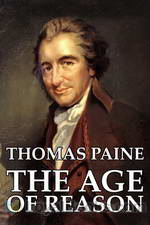 The Age of Reason
The Age of Reason
A Universalist book, The Age of Reason advocates for the existence of natural religion and challenges the structure of all organized religion. First written and distributed as pamphlets, the book was later published into two parts. Paine puts forward his personal beliefs, debating reason and revelation, while analyzing the Bible and the influence organized religion has on society. Exploring topics including natural religion, criticism of corrupt religious institutions, and distinction between rationality and blind faith in the supernatural, the book presents a guide for the conscious and free spiritual thinkers... | |
 Age of Reason (version 2)
Age of Reason (version 2)
The Age of Reason; Being an Investigation of True and Fabulous Theology is a pamphlet, written by a British and American revolutionary Thomas Paine. The Age of Reason challenges institutionalized religion and challenges the legitimacy of the Bible, the central sacred text of Christianity. Published in three parts in 1794, 1795, and 1807, it was a bestseller in the United States, where it caused a short-lived deistic revival. Part 1 was written sometime in 1793, and attacks the concepts of divine revelation and inspiration... | |
By: Thomas R. Malthus (1766-1834) | |
|---|---|
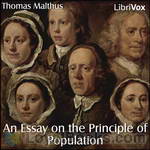 An Essay on the Principle of Population
An Essay on the Principle of Population
The power of population is indefinitely greater than the power in the earth to produce subsistence for man. Population, when unchecked, increases in a geometrical ratio. Subsistence increases only in an arithmetical ratio. A slight acquaintance with numbers will show the immensity of the first power in comparison with the second (Malthus). | |
By: Thomas Shaw (1843-1918) | |
|---|---|
 Clovers and How to Grow Them
Clovers and How to Grow Them
| |
By: Thomas Southwood Smith (1788-1831) | |
|---|---|
 Use Of The Dead To The Living
Use Of The Dead To The Living
In 1827 Thomas Southwood-Smith published The Use of the Dead to the Living, a pamphlet which argued that the current system of burial in the United Kingdom was a wasteful use of bodies that could otherwise be used for dissection by the medical profession. "If, by any appropriation of the dead, I can promote the happiness of the living, then it is my duty to conquer the reluctance I may feel to such a disposition of the dead, however well-founded or strong that reluctance may be". Southwood-Smith's lobbying helped lead to the 1832 Anatomy Act, the legislation which allowed the state to seize unclaimed corpses from workhouses and sell them to surgical schools... | |
By: Thomas Stanley Treanor | |
|---|---|
 Heroes of the Goodwin Sands
Heroes of the Goodwin Sands
| |
By: Thomas Stevens (1854-1935) | |
|---|---|
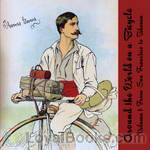 Around the World on a Bicycle, Vol. 1
Around the World on a Bicycle, Vol. 1
Thomas Stevens was the first person to circle the globe by bicycle, a large-wheeled Ordinary. His journey started in April 1884 in San Francisco from where he cycled to Boston to take a steamer to England. Crossing England, France, Central Europe and Asia Minor before he was turned back at the borders of Afghanistan. He returned part of the way to take a ship to Karachi, from where he crossed India. Another steam ship brought him from Calcutta to Hong Kong, and from Shanghai he set over to Japan, finally ending his journey after actually cycling 13... | |
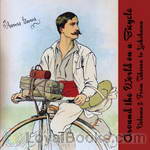 Around the World on a Bicycle, Vol. 2
Around the World on a Bicycle, Vol. 2
Thomas Stevens was the first person to circle the globe by bicycle, a large-wheeled Ordinary. His journey started in April 1884 in San Francisco from where he cycled to Boston to take a steamer to England. Crossing England, France, Central Europe and Asia Minor before he was turned back at the borders of Afghanistan. He returned part of the way to take a ship to Karachi, from where he crossed India. Another steam ship brought him from Calcutta to Hong Kong, and from Shanghai he set over to Japan, finally ending his journey after actually cycling 13... | |